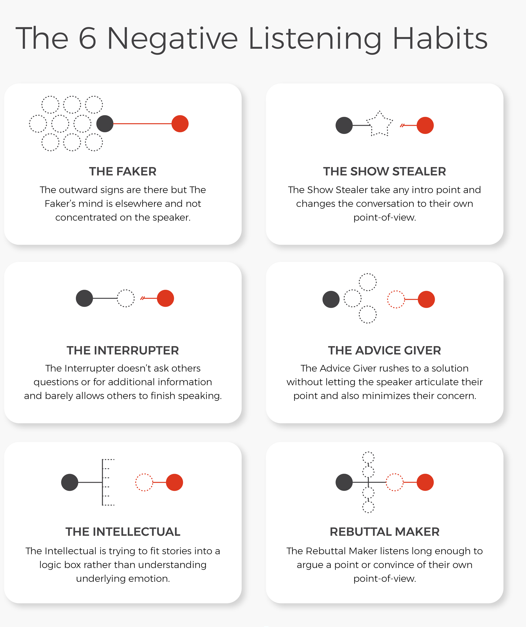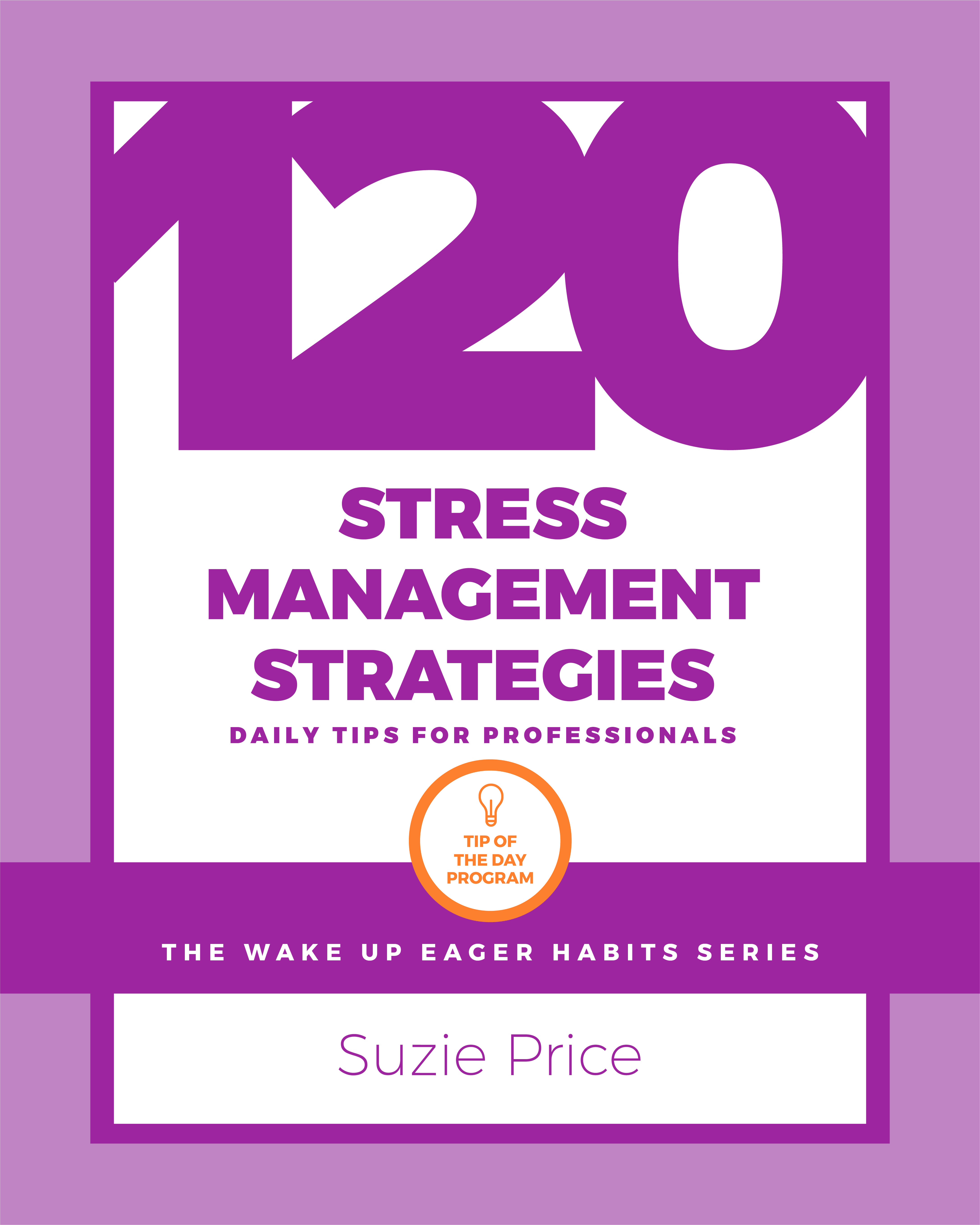The Know How You Need & the Tools to Get You There... Get Certified >

Improving Listening Skills - Do You Have Any of These Negative Listening Habits?
Improving listening skills helps you be a better, more trusted leader, advisor sales person, family member, and friend.
The three ways to best improve are: 1) Have a great role model, 2) Determine you make any of the six negative listening habits 3) Use our four-step Listening Aggressively model.
First, here's a simple, but meaningful personal example of how listening helps:
It was summer time in 1992. I had taken a long weekend to
attend my ten year high school reunion in Columbia, S.C., my home town. I was
happy to see my high school buddies.
But when I wasn’t laughing and partying, I
was worrying so much about my
career that I wasn't sleeping very well.
You see I needed to decide whether to leave my current stable but boring job for a riskier,
but more interesting, opportunity. I wanted to make the right decision, but I
had no idea what that was.
As I was having breakfast with one of my best, longest
known, friends.
I tried to talk through what was bothering me. Before I shared much about what was
going on she jumped in, offered advice and then changed the subject so we could talk
about her job.
Her advice
wasn’t helpful. I didn’t mind though because we’d been friends since
3rd
grade and she’ll always be my best friend even though she's not always a great listener.
I still felt confused and worried about what to do. That night, once again, I got little sleep.
A Great Listener Role Model...
Before the weekend was over I stopped by to visit Mary Lou,
my college
roommate’s mother. She had been very good to us when we
were in school and I liked talking to her.
She asked me
how things were going. I brought her up to speed and then
I briefly mentioned my current concerns and worry about
my career.
I wasn't planning on having a detailed conversation about it, but because she seemed
so interested and she
asked me so many questions, I talked and shared more than
I had had a chance to do with anyone else.
She didn’t seemed rushed or impatient as she listened and she didn't quickly share advice.
She just asked more questions in her attempt to
understand what I thought,
how I felt and what was going on. And as she tuned into what I was saying
with a sincere
desire to understand without interrupting in less than 15 minutes
I felt better then
I’d felt in weeks.
Something great happened. My decision was now clear to
me.
I would make the change and try the new career opportunity.
All of sudden I knew EXACTLY what I needed to do.
Listening is often the only thing needed to help someone.
Do You Have Any of These Negative Listening Habits?

Improving listening skills is something people talk about and think about, but rarely ever get around to actually improving. Mary Lou's example, all those years ago, stuck with me and has inspired me to try to be a good listener like her.
They say that it's smart to teach what you want to learn, and over the years I've taught leaders, sales people and interviewers key steps for improving listening skills. One way to get better is awareness around bad habits.
Take this simple quiz, below, to determine if you do any of these Negative Listening Habits.
|
Rate Yourself: |
Six Negative Listening Habits: |
|
3 - Oops! That's Me! |
Faker: All the outward signs are there: nodding, making eye contact giving the occasional uh-huh. However, the faker isn’t concentrating on the speaker. His mind is elsewhere. |
|
3 - Oops! That's Me! _______ |
The Interrupter: The interrupter
doesn’t allow the speaker to finish and doesn’t ask clarifying questions
or seek more information from the speaker. He’s too anxious to speak
his words and shows little concern for the speaker. |
|
3 - Oops! That's Me! |
Stealing The Show: The happy hooker uses the speaker’s words only as a way to get to his message. When the speaker says something, and frankly it could be anything, the happy hooker steals the focus and then changes to his own point of view, opinion, story or facts. Favorite hooker lines are, “Oh that’s nothing, here’s what happened to me...”, “ I remember when I was...” |
|
3 - Oops! That's Me! |
The Advice Giver: Giving advice is sometimes helpful;
however, at other times, this behavior interferes with good listening,
because it does not allow the speaker to fully articulate his feelings
or thoughts; it doesn’t help the speaker solve his own problems; it
prohibits venting; it could also belittle the speaker by minimizing a concern with a quick solution. Well-placed
advice is an important function in selling and leading. However, advice
given too quickly, and at the wrong time, is a turnoff to the speaker. |
|
3 - Oops! That's Me! |
Rebuttal-Maker: This listener only listens long enough to form a
rebuttal. His point is to use the speaker’s words against him. At his
worst, he is argumentative and wants to prove you wrong. At the least,
this person always wants to make the speaker see his point of view. |
|
3 - Oops! That's Me! |
The Intellectual or Logical Listener: This person is always trying to interpret what the speaker is saying and why. He’s judging the speaker’s words and trying to fit them into his logic box. He rarely asks about the underlying feeling or emotion attached to a message. |
|
|
Scoring Recap: What's Your Score?
|
"The greatest compliment that was ever paid me
was when one asked me what I thought, and
attended to my answer."
Henry David Thoreau
Improving Listening Skills: Resource Links
Pay attention to the negative listening habits that you rated as "Oops or Sometimes That's Me!"
Focus on becoming an aggressive listener and you will be improving your listening skills. To listen aggressively means that you are focused on hearing in a determined and energetic way. When you are doing this well you demonstrate your desire to understand by asking questions and listening with no agenda,other than to understand.
Resources:
- Begin improving listening skills IMMEDIATELY by using my four-step Listening Aggressively process See the four steps and listen to an audio example, here. It REALLY works!
- Check out these Podcast Episodes:
#27 A Powerful Leadership Skill: Listening Aggressively
#65 Deep Listening: Impact Beyond Words with Author Oscar Trimboli
- Build your and your teams build communication skills with our training.
LET'S TALK:
Contact us to schedule a Complimentary Consulting Call
or to ask questions about any of our Hiring,
Coaching, Training and Assessment services.
Get More Improving Listening Skills Insight,
Go to Charismatic Leadership - The Forgotten Skill




